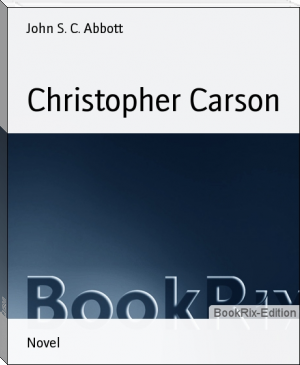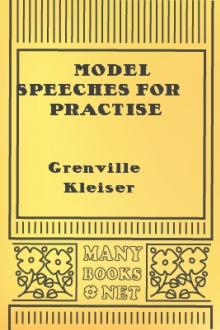Christopher Carson, John S. C. Abbott [readict books TXT] 📗

- Author: John S. C. Abbott
Book online «Christopher Carson, John S. C. Abbott [readict books TXT] 📗». Author John S. C. Abbott
Lyon where I was stationed, and the Spring rise coming on, making the fording difficult, I suggested that he be brought to my quarters, which was done on the 14th day of May.
"This enabled me to make his condition much more comfortable. In the interval of his paroxysms, he beguiled the time by relating past experiences. I read Dr. Peters' book, with the hero for my auditor; from time to time, he would comment on the incidents of his eventful life.
"It was wonderful to read of the stirring scenes, thrilling deeds, and narrow escapes, and then look at the quiet, modest, retiring, but dignified little man who had done so much.
"You are perfectly correct in describing Carson as a gentleman. He was one of nature's noblemen - a true man in all that constitutes manhood - pure - honorable - truthful - sincere - of noble impulses, a true knight-errant ever ready to defend the weak against the strong, without reward other than his own conscience.
"Carson had great contempt for noisy braggarts and shams of every sort.
"His disease rapidly progressed and he calmly contemplated his approaching death. Several times he repeated the remark, 'If it was not for this,' pointing to his chest; 'I might live to be a hundred years old.'
"I explained to him the probable mode of termination of his disease: 'that he might die from suffocation or more probably the aneurism would burst and cause death by hemorrhage.' He expressed a decided preference for the latter mode. His attacks of dyspnoea were horrible, threatening immediate dissolution. I was compelled to give chloroform to relieve him, at considerable risk of hastening a fatal result; but he begged me not to let him suffer such tortures, and if I killed him by chloroform while attempting relief, it would be much better than death by suffocation.
"Once, he remarked: 'What am I to do, I can't get along without a doctor?'
"I replied, 'I'll take care of you.'
"He, smiling, said, 'You must think I am not going to live long.'
"The night preceding death he spent more comfortably than he had for days before. He was obliged to sit up nearly all the time. He coughed up a slight amount of blood during the night, and a very little in the forenoon.
"In the afternoon, while I was lying down on his bed and he was listening to Mr. Sherrick, he suddenly called out 'Doctor, Compadre, Adios!'
"I sprang to him and seeing a gush of blood pouring from his mouth, remarked, 'this is the last of the general;' I supported his forehead on my hand, while death speedily closed the scene.
"The aneurism had ruptured into the trachea. Death took place at 4.25 P.M., May 23rd 1868.
"Mr. Carson was a small man not over five feet six inches tall, with gray eyes, light-brown hair tinged with gray; his head was large; forehead high and broad; his nose somewhat _retroussé_. He had a good broad chest and a compact form. He had been a remarkably quick active man and what he lacked in strength, he made up in agility. It is related of him, that while he was in command of his regiment and on a campaign against the Navajo Indians, he would leave camp very early each morning, taking his Ute Indian scouts, and let his lieutenant-colonel take charge of the regiment; before the command would have time to come up with the fugitive enemy, Carson and his Utes had finished the fighting.
"I am under the impression that the Navajo nation, numbering 8,000 or 10,000 people were so severely pressed by Kit Carson, that they surrendered to him, and were put on a government reservation, where they remained under military control, for several years. Within the last three years they have been permitted to return to the country formerly occupied by them; but I am not positive of the above.
"Carson was made a brigadier-general of volunteers by brevet, at the close of the rebellion.
"Shortly after coming to my quarters he made his will, and left property to the value of seven thousand dollars to his children.
"No post-mortem was made. The pulse at the right radial artery was very indistinct, while the left continued good.
"I have been thus minute, thinking that while writing his life, you had grown to love him, as all who knew him certainly cherished great affection for him.
"Yours Truly, H. R. Tilton, Ass't Surgeon U.S. Army." Imprint
"This enabled me to make his condition much more comfortable. In the interval of his paroxysms, he beguiled the time by relating past experiences. I read Dr. Peters' book, with the hero for my auditor; from time to time, he would comment on the incidents of his eventful life.
"It was wonderful to read of the stirring scenes, thrilling deeds, and narrow escapes, and then look at the quiet, modest, retiring, but dignified little man who had done so much.
"You are perfectly correct in describing Carson as a gentleman. He was one of nature's noblemen - a true man in all that constitutes manhood - pure - honorable - truthful - sincere - of noble impulses, a true knight-errant ever ready to defend the weak against the strong, without reward other than his own conscience.
"Carson had great contempt for noisy braggarts and shams of every sort.
"His disease rapidly progressed and he calmly contemplated his approaching death. Several times he repeated the remark, 'If it was not for this,' pointing to his chest; 'I might live to be a hundred years old.'
"I explained to him the probable mode of termination of his disease: 'that he might die from suffocation or more probably the aneurism would burst and cause death by hemorrhage.' He expressed a decided preference for the latter mode. His attacks of dyspnoea were horrible, threatening immediate dissolution. I was compelled to give chloroform to relieve him, at considerable risk of hastening a fatal result; but he begged me not to let him suffer such tortures, and if I killed him by chloroform while attempting relief, it would be much better than death by suffocation.
"Once, he remarked: 'What am I to do, I can't get along without a doctor?'
"I replied, 'I'll take care of you.'
"He, smiling, said, 'You must think I am not going to live long.'
"The night preceding death he spent more comfortably than he had for days before. He was obliged to sit up nearly all the time. He coughed up a slight amount of blood during the night, and a very little in the forenoon.
"In the afternoon, while I was lying down on his bed and he was listening to Mr. Sherrick, he suddenly called out 'Doctor, Compadre, Adios!'
"I sprang to him and seeing a gush of blood pouring from his mouth, remarked, 'this is the last of the general;' I supported his forehead on my hand, while death speedily closed the scene.
"The aneurism had ruptured into the trachea. Death took place at 4.25 P.M., May 23rd 1868.
"Mr. Carson was a small man not over five feet six inches tall, with gray eyes, light-brown hair tinged with gray; his head was large; forehead high and broad; his nose somewhat _retroussé_. He had a good broad chest and a compact form. He had been a remarkably quick active man and what he lacked in strength, he made up in agility. It is related of him, that while he was in command of his regiment and on a campaign against the Navajo Indians, he would leave camp very early each morning, taking his Ute Indian scouts, and let his lieutenant-colonel take charge of the regiment; before the command would have time to come up with the fugitive enemy, Carson and his Utes had finished the fighting.
"I am under the impression that the Navajo nation, numbering 8,000 or 10,000 people were so severely pressed by Kit Carson, that they surrendered to him, and were put on a government reservation, where they remained under military control, for several years. Within the last three years they have been permitted to return to the country formerly occupied by them; but I am not positive of the above.
"Carson was made a brigadier-general of volunteers by brevet, at the close of the rebellion.
"Shortly after coming to my quarters he made his will, and left property to the value of seven thousand dollars to his children.
"No post-mortem was made. The pulse at the right radial artery was very indistinct, while the left continued good.
"I have been thus minute, thinking that while writing his life, you had grown to love him, as all who knew him certainly cherished great affection for him.
"Yours Truly, H. R. Tilton, Ass't Surgeon U.S. Army." Imprint
Publication Date: 05-06-2008
All Rights Reserved
Free e-book «Christopher Carson, John S. C. Abbott [readict books TXT] 📗» - read online now
Similar e-books:





Comments (0)